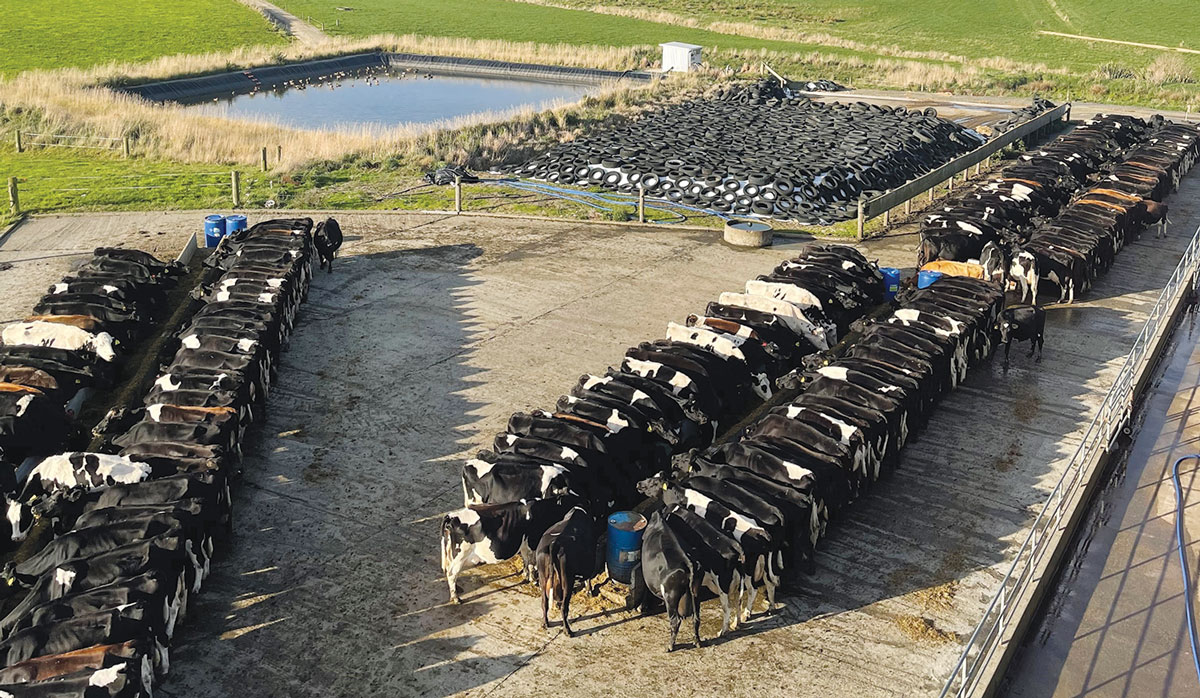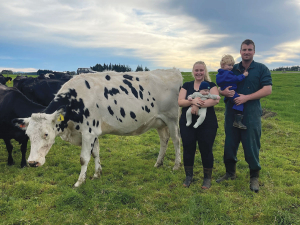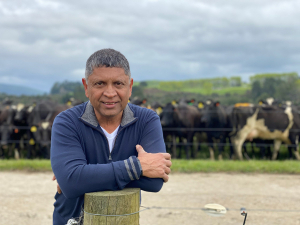First established in 1950 by Dylan’s great-grandfather James Lynch, a WWII returned soldier, the rehab block of land in the Thames Valley became synonymous with a pedigree herd of the highest quality.
In 1950, James purchased some pedigree animals from the Arataki Stud in Te Awamutu and in 1955, eight yearling heifers from Carreys Bros dispersal sale at Thames.
Roseview Echo Champion featured strongly in the herd’s breeding, and the herd’s well-known Gail family was established with the purchase of Ariki Pietje Champion who was bred through Pukeroro Champion Pietje.
Over time Dylan’s grandparents Michael and Moya Lynch took over the farm, taking the stud to the next level; a number of Lyncrest bulls have been entered and proven in the sire teams of LIC and CRV.
Fast forward two generations: Dylan grew up in the Waikato and after school he went straight into farming with the exception of around 18 months working for a local contractor.
“A lot of my friends went on an OE, but I wanted to stay in New Zealand and continue hunting and living an outdoor lifestyle,” he says.
“I went down to the South Island with the expectation of staying for ‘a year or so’, but seven years later I’m still here, with no plans to leave.”
Natasha was brought up on a sheep and beef farm on the coast at Milton, near Dunedin.
“I dragged her into dairying,” Dylan says. “But she’s well and truly into it now.”
Dylan and Natasha have two children, Jackson and Reuben. The couple worked for Owen and Cathy Copinga, managing Rivendell Farm, which Dylan says was a fantastic place to learn. They then went contract milking, before sharemilking for the first time last season on a farm owned by Winnie van Rossum.
Wanting to carry on Michael and Moya’s work with Lyncrest Stud, but not wanting to return to Waikato’s challenging dry summers, Dylan made the decision to transport the stud’s pedigree cows 1,500km from Thames Valley to rural Invercargill.
The Invercargill farm is 84ha of flat to rolling land, on which Dylan and Natasha milk 285 cows. All cows calve in barns, and the colostrum cows are taken inside at night, too.
“We really strive to look after our cows in spring, and keep them out of the harsh weather,” Dylan says.
“Production-wise we are doing over 550 kgMS/cow and are on track to do 600 kgMS/cow, or 2,000 kgMS/ha.”
Dylan says the farm system is pasture-based but ensures the cows are fully fed, and that means feeding supplements.
“Our top cows are doing 850 kgMS,” he says. “We made a strategic change last season to lower the stocking rate by 15 cows and ended up doing more production per cow by around 20 kgMS. With the inflation of feed costs and fertiliser it is not profitable to have more cows.”
 |
|---|
|
Dylan Lynch says the Holstein Friesian breed is ideal for a business.
|
Mating is 10 weeks, including seven weeks of AI to breed replacements before the bulls are put out for the next 25 days to finish.
Sexed Semen for Mating
The 2021/22 season was the first in which Dylan Lynch and Natasha Maybee used sexed semen on the top 10% of the herd; cows that had a premating heat and the top cows in the herd got one straw of sexed semen in the first three weeks of mating.
“This mating we are going to go heavy on the sexed semen now that we know it was successful in the herd,” Dylan says. “Most likely the top two thirds of the herd will get sexed semen this year.”
They rear 100 replacements annually.
When breeding, Dylan and Natasha are “super fussy” on udder scores because of the production they are pushing through the cows.
“We focus on components over volume, choosing bulls with good components and at least medium milk volume,” Dylan says.
This season, a large portion of the herd was in calf to Meander Shot Alibi-ET S3F. They currently have 21 pedigree animals in the herd, and two thirds are from overseas genetics; of those, eight or nine are sired by Plain-Knoll King Royal-ET.
“I don’t think there’s one cow from King Royal I don’t like,” Dylan says. “The top King Royal heifers are producing what a mature cow can.”
Dylan says there is one 10-year-old cow in the herd that is outstanding for production and type - Lyncrest Fever Bridie EX, who has excellent components of fat 5.23% and protein 4.26%. Bridie produced 842kgMS last season, with her lactation finishing in February 2022.
Dylan says the Holstein Friesian breed is ideal for a business that is focused on production. “You can’t go past a Holstein Friesian when you’re wanting to push big milk out,” he says.
Dylan and Natasha, who want to focus on reducing debt quickly so they can get into a bigger herd and farm in the next one-two years, would love to stay within Winnie’s portfolio of farms.
“We love her farming philosophy,” Dylan says.
“She is not driven by BW, but rather production per cow. She is more interested in the theory of liveweight: if a cow is 600kg, we want her doing 600kgMS. Our top cows are sitting at around 1.45 times their liveweight.”












